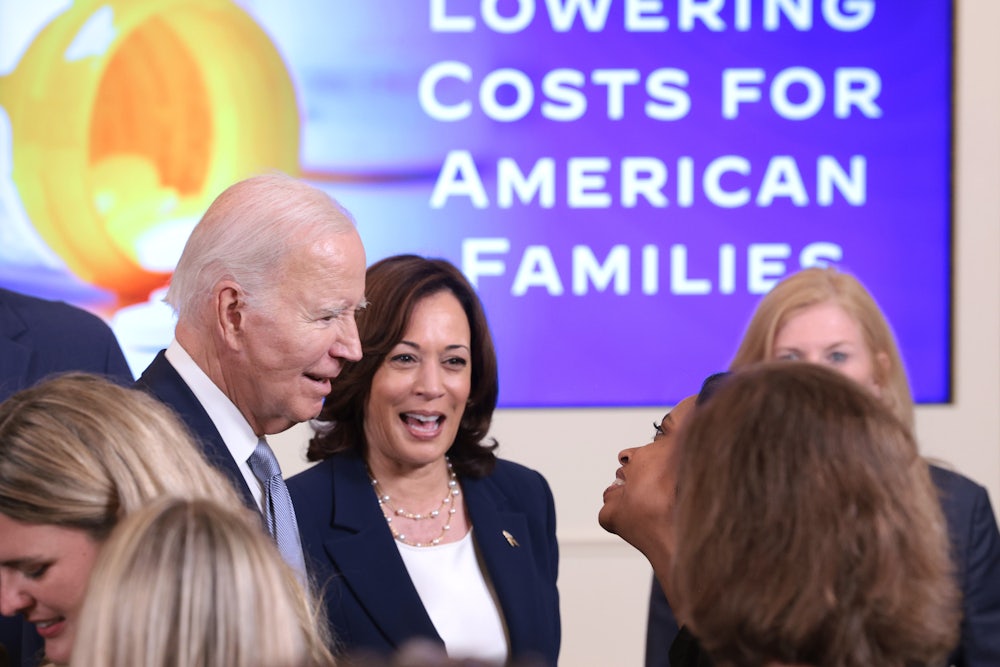Kamala Harris will deliver a speech Friday laying out her economic policy, and a lot of it will be about corporate price gouging. The focus, reportedly, will be on groceries, which theoretically offers some opportunity to discuss the Federal Trade Commission’s challenge to a proposed merger between the Kroger and Albertson’s supermarket chains—except the FTC’s antitrust action is about economic concentration lowering wages, not raising prices. A better example of price gouging and how to curb it is the Biden administration’s war on drug prices.
Spotlighting drug-price reductions is also more timely because on Thursday the White House announced Medicare’s first-ever negotiated drug-price reductions, and these are substantial. Starting in 2026 Medicare will discount 10 drugs selected, based on how widely they’re used, for the first round of negotiations. The discounts will run from 38 to 79 percent, saving taxpayers $6 billion and Medicare patients $1.5 billion in out-of-pocket costs. For nine of the 10 drugs, prices will be cut more than 50 percent. (Click here for a list of the drugs and the negotiated discounts.)
Among other talking points, Harris can say that while Trump promises to lower drug prices (“We are going to deliver lower prices, low drug costs,” he said Wednesday), the Biden administration is actually doing it. The lowering of Medicare drug prices also helps Harris answer Trump’s lunge for the elderly vote by promising to eliminate taxes on Social Security. Again she can say: You promise, we deliver.
Medicare price negotiation is a stunning legislative and administrative accomplishment. As I explain in The New Republic’s current print issue (“How the Democrats Finally Took on Big Pharma”), the 2003 legislation creating a Medicare drug benefit explicitly barred the federal government from negotiating volume discounts for Medicare drugs. The ban was a sop to Big Pharma—one that a succession of presidents, starting with George W. Bush, tried and failed to undo until Biden and the Democrats inserted price-negotiation language into the 2022 Inflation Reduction Act. Credit for getting drug companies to negotiate Medicare discounts resides exclusively with Democrats, because not even one Republican member of Congress could bring themself to vote for the IRA. The same can be said of a separate provision in the IRA that capped Medicare patients’ monthly out-of-pocket costs for insulin at $35. That’s exclusively a Democratic achievement too.
Writing in The Washington Post, Dan Diamond and Rachel Roubein observe that
Democrats have struggled to make voters aware of the impending—but not yet realized—benefits of the price negotiations. The lack of public awareness is a challenge for vulnerable Democrats planning to run on the party’s most significant health-care legislation in more than a decade.
Diamond and Roubein cite a May poll by KFF, formerly known as the Kaiser Family Foundation, that showed only about one-third of voters knew there was a law that allowed Medicare to negotiate drug-price discounts. It’s now Harris’s task to raise awareness of this achievement.
As I write this, Harris and President Joe Biden are expected to talk up the price discounts at a joint appearance Thursday afternoon. But as I argued in my print piece, health care policy mustn’t be thought of as something distinct from economic policy; it pretty much is economic policy. That’s because high prices limit access to health care; because health care is the nation’s largest industry sector; and because, apart from the defense industry (which is much smaller), health care is the industry sector over which the federal government exercises the most control. Polls show that voters are well aware that Trump and the Republicans have an inferior record on health care—the truth is they have practically no record at all, unless you count Trump’s deadly mismanagement of the Covid crisis.
Negotiated Medicare drug prices should be a central point not only in Harris’s Friday speech on economic policy but in all her discussion of economic policy going forward. In fact, it wouldn’t be a bad idea for her to mention it in every speech. It is, as Biden would say, a big fucking deal.








